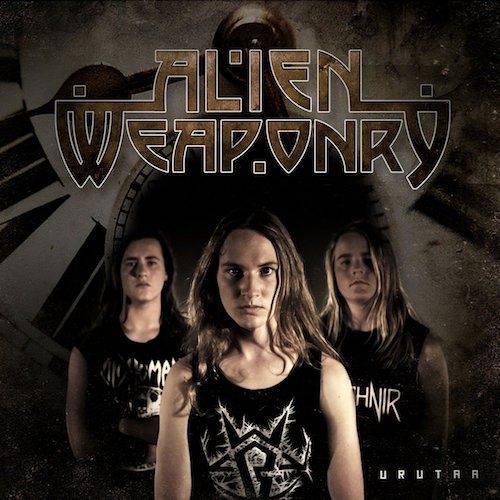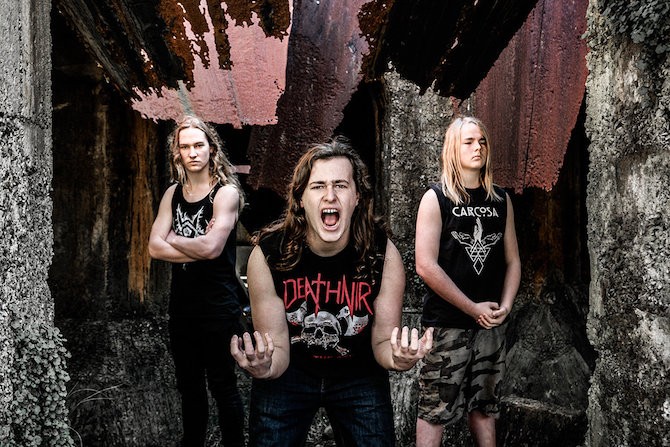(Our friend and long-time NCS supporter Booker from New Zealand prepared this guest post about an unusual new band from NZ named Alien Weaponry.)
New Zealand is a strange place; trust me, I live here. It refers to itself as “God’s own” country, and sees itself as an idyllic little egalitarian (supposedly) land at the edge of the earth, filled with natural beauty, and sparsely populated with easy-going sports-loving people. And yet, behind this idyllic facade it hides a dark past – and hides it well. But as readers of this site know, the hidden, darker side of human nature just happens to be something of a favourite theme for metal. All too often society seems to act like the evil queen in Snow White, only wanting the mirror it holds up to shower it with platitudes and reflect the good. But metal holds up the mirror which flatters not.
Not surprisingly, then, eventually a New Zealand metal band would come along which would dare speak openly of the country’s past. But what would be a surprise, is that it would take a band whose members are still in high school to do it – and in what seems to be a world first, do it with lyrics in Te Reo, the language of the indigenous Māori people. Welcome to Alien Weaponry.
Those of us old enough to remember the comedy Fawlty Towers, starring John Cleese, will probably recall the consternation of his character Basil Fawlty whenever a German customer came to stay. “Don’t mention the war!”, he’d rush around telling the staff – and himself. But like telling someone “don’t think of white elephants”, once he came face to face with serving a German customer, inevitably his tongue would slip and after all his efforts, hilarity and embarrassment was sure to follow when he’d be the one accidentally bringing up the war.
Strangely, when I think of my country I can’t help but think of Basil. Don’t mention the war is like an unspoken national motto, even though it’s a piece of history which is the elephant in the room in terms of all kinds of problems New Zealand still faces (or, refuses to face) now. Some New Zealanders who read this will probably think I’m referring to WWII. But no – the New Zealand of today began with a brutal war, or more correctly series of wars, known either as the New Zealand wars or sometimes by the rather racist name the Māori wars.
According to The Font Of All Human Knowledge:
“At the peak of hostilities in the 1860s, 18,000 British troops, supported by artillery, cavalry and local militia, battled about 4000 Māori warriors in what became a gross imbalance of manpower and weaponry. Although outnumbered, the Māori were able to withstand their enemy with techniques that included anti-artillery bunkers and the use of carefully placed pā, or fortified villages, that allowed them to block their enemy advance and often inflict heavy losses, yet quickly abandon their positions without significant loss.”
The New Zealand wars have been the subject of academic works and historical debate, but have received little attention in novels, movies or music; the most famous is probably the movie Utu (revenge), which screened way back in 1983. In one interview with the band, they reveal that part of the inspiration for covering the wars in their music came from watching the series Vikings and wondering what a similar adaptation of New Zealand history would look like. And I concur that would be a hell of a series: both histories feature uncertain long journeys over expanses of oceans, brutal hand-to-hand combat, and a strongly personal connection with gods and spirits experienced as very much alive.
Alien Weaponry consist of Ethan Trembath on bass and brothers Lewis de Jong, on guitar and vocals, and Henry de Jong on drums. In an interview done in October last year, they were aged 16 (Henry) and 14 (Ethan and Lewis), so this is very much a teenage band – like, literally. Despite their young age, Alien Weaponry have already made waves in the local music scene: firstly by winning the 2016 Smokefreerockquest – a national “battle of the bands” for school-aged groups, and secondly by winning the 2016 Smokefree Pacifica Beats – something of an unexpected coup for a metal band, as the competition is typically dominated by mainstream, R&B, rap and so-called urban acts.
Alien Weaponry are currently in the process of recording their first full-length, but have already let a few singles drop from the forthcoming release. After a tip-off from a friend, mysteriously only ever known as TL, I heard one of those singles, “Rū Ana Te Whenua“, shortly after it was released a few weeks ago – and was seriously impressed with what such a young 3-piece had achieved. In various interviews they have described their sound as like a heavily groove-based thrash metal, or thrash metal without solos. And some seriously headbang-worthy groove is very much on show on the tracks they’ve put out so far, most notably “Raupatu”, below. As stated in the text at the end of the music video:
“In 1863 the New Zealand colonial government passed a law enabling the confiscation of lands from anyone they deemed to be ‘rebels’. In this way, millions of acres were stolen from their Māori owners, plunging these communities into poverty and changing the balance of power and the face of history in this country for ever. These unjust actions were called raupatu.”
The other accomplishment these chaps have pulled off is putting out what is, to the best of my knowledge, the first metal in the Māori language. On an international stage it’s probably best known as the language our national rugby team, the All Blacks, use in the haka they perform before they play. The haka is traditional war dance, so it should come as no surprise that the language’s rhythm and intonation lends itself well to aggression. Alien Weaponry show in “Raupatu” that it’s just at home in a substantial amount of groove.
That other single, “Rū Ana Te Whenua“, dials back on the groove and takes a more aggressive approach. Fitting, given the subject matter: the lyrics tell the story of the battle of Pukehinahina (Gate Pā) in what is now Tauranga. By all accounts a brutal conflict within an already brutal war, The Font Of All Human Knowledge notes that the Māori forces from Ngāi Te Rangi, Ngāti Koheriki and Piri-Rikau “withstood a day-long bombardment in their underground shelters and trenches” with a battery that was the “heaviest used in the wars of 1863–64”. Despite the colonial forces eventually being victorious, it was “the single most devastating defeat suffered by the British military in the New Zealand wars” with about a third of the colonial forces killed, compared to about a tenth of the Māori soldiers.
There’s no word yet on when Alien Weaponry’s album will drop, but the two tracks above and three others are available on their Bandcamp page:
https://alienweaponry.bandcamp.com/
Official website:
http://alienweaponry.com/
Facebook:
https://www.facebook.com/AlienWeaponry



Suddenly your username makes much more sense.
Oh, shit, wait. I should have read that intro blurb more closely.
I liked the music nonetheless.
I’m guessing you meant Islander’s username made more sense? He does actually have that name from living on an island! From what I understand, it’s a cross between Arnold Bocklin’s Isle of the Dead and the island of Doctor Moreau, with more slow lorises. Don’t ask what he’s up to over there.
Have you been surveilling me? The lorises don’t take kindly to surveillance, and you definitely don’t want to get on the bad side of those fiends.
I get the feeling my famous last words will be: “awww, but they’re so cute, they wouldn’t harm anyone” 😉
They have an audio archive of “last word” recordings which they listen to as you would listen to music, and those are in fact the most-uttered final words, followed by, “I’m going to tickle this one under its arms”.